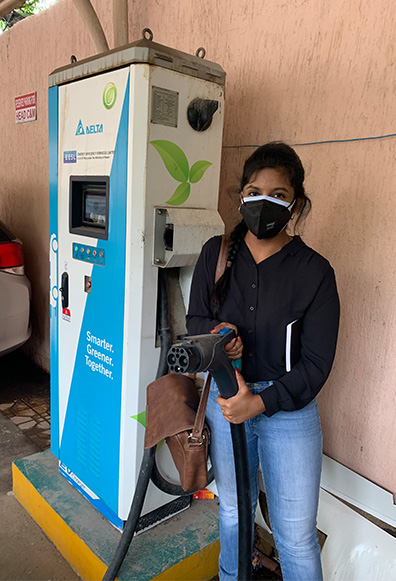Countries:
India
Status:
Completed
Sector:
Mobility
Piloting the concept of utility-led managed electric vehicle (EV) charging in India to demonstrate its potential as a critical tool for power utilities in achieving their demand-side objectives.
To reduce carbon emissions and air pollution, India has prioritised low-carbon transition across the energy and mobility sectors. Given the drive to increase uptake of EVs, establishing charging infrastructure to meet this demand is key – representing both an opportunity and a challenge for utilities, considering the surge in demand for charging. As a result, this project laid the foundation for managed charging in a nascent but fast-growing Indian EV market by examining technical, policy, pricing options and mechanisms. All while demonstrating use of utility-led managed charging to balance EV loads under real-life scenarios of peak demand and network congestion.
Although Gender Equality and Social Inclusion (GESI) analysis of the EV market in India is limited, specific activities were carried out to ensure needs and barriers for women and low-income drivers were identified and represented in policy recommendations.
This project was delivered by eDRV in partnership with BSES Yamuna Power Limited (BYPL) and Council of Energy, Environment and Water (CEEW)
“Smart solutions, such as managed charging or the use of smart plugs are very important in delivering more real-time ToD benefits to the end-user, in Delhi and across the country.”
Mr. Mukesh Dadhich
Head – Sustainability and Cleantech, BSES Yamuna Power Limited
“Electric vehicles are extremely woman-friendly. They’re simpler to drive, less bulky to manoeuvre and make absolutely no sound whatsoever.”
Ms. Jayanthi R Prasad
an EV user in Bangalore, India
.png)
Installed 24 smart plugs in two charging stations to assess demand side management for three- and four-wheel electric rickshaws
Developed a framework to identify time-of-day pricing and potential economic savings
Highlighted the need for policies that help reduce initial investments when setting up charging stations
Established a stakeholder network and delivered discussions between various industry stakeholders, including an “Introducing Utility-led Managed EV Charging in India” webinar
In its initial steps, assessments were carried out to highlight the benefits of managed charging to the project counterpart, BSES Yamuna Power Limited (BYPL), and other key stakeholders. This included procuring equipment for setting up charging stations on pilot sites, experimentation with three-and-four-wheel electric rickshaw fleets and gathering data to assess the demand-side management potential.
Key results of the assessments included:
The findings about the possibility and potential benefits of managed charging initiatives were shared in discussions between various industry stakeholders, including power distribution utilities, charge point operators, and EV users. Through the pilot project, the team demonstrated the managed charging capabilities, benefits, and challenges in introducing managed charging for electric three and four-wheelers.
Identified and focused on charging stations for electric three-wheeler drivers from low-income communities
Reached out to charge point operators, fleet operators and female drivers of personal electric cars to identify their needs and concerns
Worked with BYPL to identify women-friendly charging stations
Ensured highest possible representation of women in outreach activities, including knowledge-sharing events
To develop a smart charging proof of concept and gender-inclusive policy recommendations in the absence of gender-disaggregated data, the project investigated women drivers’ EV charging needs. This was done by engaging with charging point operators, fleet operators, and female EV drivers to identify and record specific needs and concerns of women. The research found that their primary concern is safety when using public charging stations, while many lacked the knowledge needed to feel comfortable entering the EV space. The findings also confirmed that charge point operators do not collect gender-disaggregated data to track different charging behaviours.
BYPL was requested to identify women-friendly charging stations for the pilot activities. The project also ensured that a gender balanced team was engaged, and a good female representation was present in outreach activities (e.g., webinar and Q&A videos).
Low-income groups were also considered in the project. The majority of the electric three-wheeler drivers are from low-income communities in Delhi. The team worked with BYPL to identify charging stations which primarily cater to low-income communities. The project plan included running managed charging experiments at two of these charging stations.
GESI-related findings were integrated when developing targeted policy recommendations for a managed charging programme that can benefit women and low-income groups.

Learnings indicate that managed charging:
A top-down, mandatory implementation may not be effective due to varying levels of EV shares across provinces/states, plus differing energy mix and load profiles. The project identified this framework for utilities to implement managed charging programmes per service area:
Considerations of women’s and low-income communities’ different charging needs must also be integrated into solutions.
UK PACT (Partnering for Accelerated Climate Transitions) is a unique capacity-building programme. Jointly governed and funded by the UK Government’s Foreign, Commonwealth and Development Office (FCDO) and the Department for Energy Security and Net Zero (DESNZ) through the UK's International Climate Finance, it works in partnership with countries with high emissions reduction potential to support them to implement and increase their ambitions for tackling climate change.
© Copyright 2025 UK PACT Privacy Notice Cookie Policy